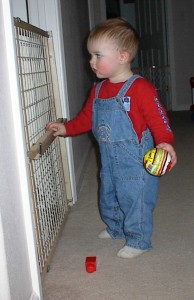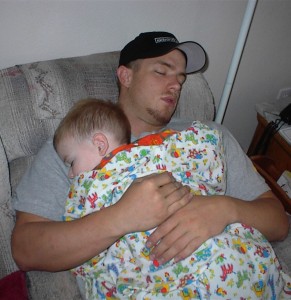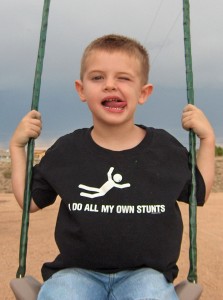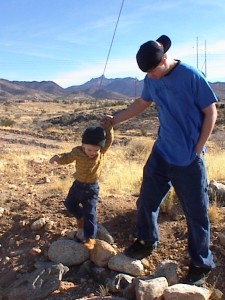
The inspiration for this page came after reading yet another of those magazines that contained an article regarding how to raise a child. I thought, what’s the problem here? Don’t people realize how to raise a child anymore? There has been so much written as to be careful, don’t hurt your child’s feelings, don’t ever spank your child, don’t stifle their creativity, don’t do this, don’t do that, etc. Now look at our children, and sociey, in general, and see what we’ve created. I am aghast at what the youth of today do, are allowed to do, and are allowed to get away with. Why? Why do we, as adults, tolerate this behavior? Why is the unacceptable being forced down our throats until it becomes the accepted norm? Who is letting this happen? We are. As adults, it’s time we take charge of our fate and that of our children.
Children need rules. They need guidelines. They need consistency. They need to know that you mean business. What you say goes, without question or explanation. When my son was a toddler, I would tell him to do something and he would ask, “Why?” For several months, I would spend my time trying to explain the reason I wanted him to, for example, pick up his toys. Once I was at a friend’s house. (She happened to be an elementary school teacher.) She said, “If you don’t do something with his behavior, you’re really going to have trouble with him later on.” This remark took me by surprise. I asked what she meant. She said, “You’re the adult. Why are you trying to reason with a two-year-old? He should do what you tell him without explanation.” It was like someone had hit me with a ton of bricks. I hadn’t realized what I had been doing. He was my first child. For the first two years of his life, I had read the baby magazines, read Dr. Spock, read everything I could get my hands on regarding how to raise a child. I wanted, so badly, to raise him to be the best kid ever. How could I have let this happen?

I began doing a lot of soul searching. What was wrong with me? I turned out okay, didn’t I? I am responsible, considerate, generous, trustworthy, and moral. What was wrong with raising him the way I was raised? Why did I have to raise him according to the magazines and new studies? At that point, I decided this was it. I would discipline him the same was I was disciplined. No longer would I sit and reason with him. When I told him to do something, he would do it.
Easier said than done. It took a lot of time and energy to undo those months of trying to explain why to him. “Because I said so” is a good enough explanation for a two-year-old. At first he refused, sat down, pouted, cried, did everything he could not to do what I asked. By this time I’m thinking, “What kind of monster have I created?” I literally would drag him to his toys, wrap his arms around them, and while holding his arms firmly so he couldn’t drop them, I would walk him over to his toy box, then release his arms. It was awful. He fussed and cried, but I didn’t back down. Slowly, he learned that when I told him to do something, he was going to do it, whether he wanted to or not.

Teaching responsibility needs to start as soon as your child is old enough to walk. I’ve read that you should “childproof” your house. What does that mean? Generally, put up breakables, rearrange your home decor to make it so that your child can’t break anything you value. Why? What’s wrong with keeping things the way you like them? Nothing. The person who came up with this brilliant idea was obviously too lazy to keep an eye on and pay attention to what their children are doing. When your child reaches for something he shouldn’t have, a simple slap on the hands and firmly saying “No” works wonders. I speak from experience here. A few occurrences of this, and your child has learned that certain things are not for him to play with, that these things are yours, not his, and he can’t have them. Of course, use your common sense. Go ahead and put great-grandmother’s crystal vase away until you have taught your child this simple lesson.
A toddler loves to help. When you are cleaning, let him help you. Give him a clean rag and let him “dust” for you. They think they’re helping and it keeps them in the same room as you, so you can keep an eye on them.

Offer positive reinforcement for the good deeds they are doing, just as you should discipline them for negative actions. Children are sponges. With a little repetition, they catch on quickly. Cuddles and hugs are always the best rewards.
A child who has learned to throw a temper tantrum is a pain to all those around him. If your child throws a tantrum when you try to discipline him, don’t comfort him. Unless the child has physically hurt themselves and needs first aid, let them throw their fit while you continue your activity. Once the child realizes that you are not going to do anything because he’s throwing a tantrum, he will stop. When the tantrum has passed, ask him if he’s done. If he’s not, and he’s still mad, I can guarantee the tears and fit will start all over again because you reminded him of it. Eventually, he’ll get tired of crying and forget what he was crying about in the first place. At this time, calmly offer a tissue, help him blow his nose and get him interested in another activity. There is no need to reward inappropriate behavior. You are the adult. Don’t let your child control you. It may be hard at first to listen to him cry, but in the long run, you’ll be glad you did.
I have seen parents who reward crying by immediately running to them, cuddling and trying to get them to stop crying. Why? If you are at someone else’s house and all of a sudden, you child decides to throw a fit because you told him no, what do you do? First, you should immediately be embarrassed because your child is acting in such a manner. The second thing you should do, is briefly explain to the adults present that you are not going to reinforce this behavior by giving him attention. If they are reasonable adults, and I think most are, they will understand what you’re doing and respect you for it. If the child is too disruptive, pick him up and put him in another room. You’ll hear when the crying stops. When it does, ask him if he’s ready to behave and if not, leave him in the room. A few minutes alone can work wonders.